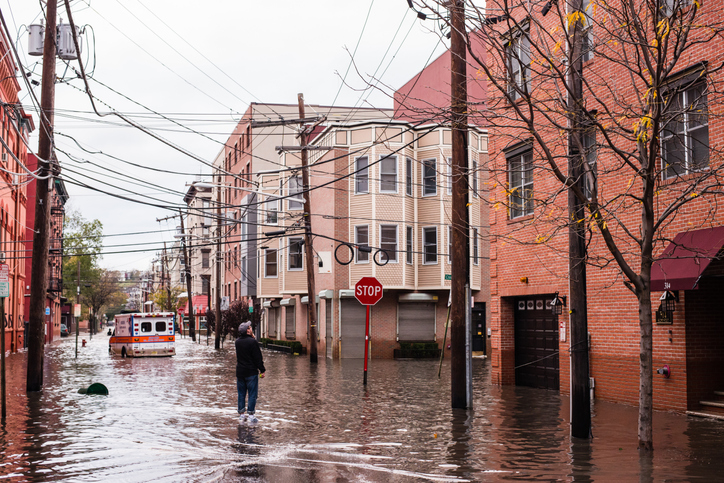
“Hoboken, New Jersey, USA – October 31, 2012: Man standing on the flooded street is talking to someone left in the building, ambulance car in the background”
Is your home located on the Jersey Shore, or near a river, creek, or other bodies of water? If so then it might be in a flood zone, even if it doesn’t have a history of flooding.
To find out, check out this tool from the Federal Agency Management Agency or FEMA. Knowing if your home is in a flood zone is important for several reasons.
- To check if you need flood insurance
While flood insurance is not legally required in New Jersey or any other state, lenders often ask for flood insurance before approving financing for a home in a flood zone. If you put your property on the market, whether or not you have flood insurance can affect a buyer’s decision to buy the home. Additionally, flood insurance can cover you for damages in case your home does get flooded. - To see how much flood insurance you should get
Insurance companies determine flood insurance premiums based on the flood risk in your area. Flood zones are categorized by tiers – the higher the risk in your area, the higher the insurance premium you have to pay. - To see if your property’s value is affected
If your home is in a flood zone, this can pull down its market value and make it less desirable to buyers. However, you can offset this by implementing a few strategies.
How to mitigate lower property values for homes in a flood zone
- Adjust your selling priceFirst, you need to determine on which flood zone tier your home falls under. If it’s an area with minimal flooding, your home’s value may not even be affected at all. If your home is in an area with moderate flood risk or higher, then you may have to make some adjustments in your pricing. Talk with your Realtor about the right strategy. Their experience and knowhow can help you determine how much to adjust your selling price for, if at all.
- Make home improvements that can reduce flood risksWhile you can’t stop flooding in your home, you can undertake improvements that can minimize its effects. For example, elevating the first floor even just slightly above the base flood elevation may prevent floodwater from getting into the home.
Consider adding flood vents to your crawl spaces, as well. This will help prevent flood water from collecting at these spaces, which can threaten your foundation. In addition, relocating utilities to a higher position can prevent damages when flooding occurs.
Consult an expert to learn about the home improvements you can make.
- Offer to pay for all or part of the insurance bill
Give the buyer incentive to buy your home by offering to foot part or all of their insurance expense. You may do this through a discount on the selling price or through closing cost credits. - Petition for your area to be re-classified
If your area has never flooded despite being in a flood zone, point this out to the buyer. This can allay their fears about having to deal with flooding problems in the future.Additionally, you can file a zoning appeal with FEMA to downgrade or remove your flood zone categorization. Flood zones change all the time. If you can show proof and convince FEMA that your home is not in a hazard zone, then you can keep its value and have less difficulty in selling it.
Consult an experienced and knowledgeable Realtor about flood zones
Call Colleen Meyler to learn more about your options in selling your home. Get in touch with her today at 732.995.5102or leave a note here.